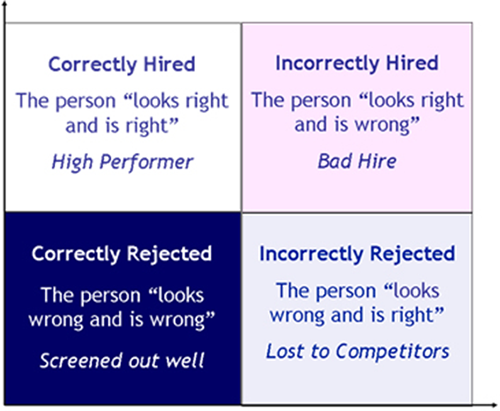Assessments for Recruitment
Unlike an interview, where candidates can practice and can take the focus off their weaknesses, psychological assessment is excellent at revealing attributes about an individual that they may not want a prospective employer to know.
The aim of a recruitment process is to select superior rather than average performers and as a result, the cost of a more robust assessment process is recouped over and over again by the fact that you have a high performing individual and team.
The information gathered through psychometric assessment is one piece of the recruitment picture and provides valuable information which adds to the overall picture of a candidate.

Informed Risk Assessment
By using robust psychometrics as one of a number of tools to gather data on your candidate, you are more likely to uncover their strengths and weaknesses and make an informed risk assessment.
Should the assessments reveal information that may affect their performance in the role, we recommend reference checking or interviewing around these results to ascertain the impact on previous performance.
While we all have strengths and weaknesses, sometimes people are considered for a role which will be a major stretch for them and their abilities. It is best to know who much of a stretch it is so you can mitigate the risk by supporting them with training and development or selecting a candidate who is a better fit.

By assessing individuals prior to employment:
- The manager and organisation has valuable information about the individual and their training needs.
- The organisation then can decide if they have the time, energy and budget to support this individual to become fully successful in the role.
- The individual can decide if this is the right role for them and their particular strengths and development areas.
Reducing Incorrectly Hired and Incorrectly Rejected
As the model below shows we want to reduce the number of Incorrectly Hired and Incorrectly Rejected candidates.

While it would be ideal if we could always select the right person and reject the person who would be unsuccessful in a role (correctly rejected) we often overlook the loss of the people who are incorrectly rejected. Perhaps they are poor interviewees, but underneath have great potential to do the role, this is where assessments can get underneath and give an objective measure of their abilities and fit with a role.
We also want to reduce the number of people who are bad hires, that is they can look good in their CV and interview, but who do not work out on the job and are poor performers. Alongside the other information gathered in the selection process, psychometric assessment results give objective information on which to analyse your hiring decisions.
The most sophisticated recruitment process that takes assessments to the next level is High Performance Modelling. This is where the organisation assesses high and low performers and these results can be used to model the ideal preferences and attributes it takes to be successful in a chosen role or culture.
